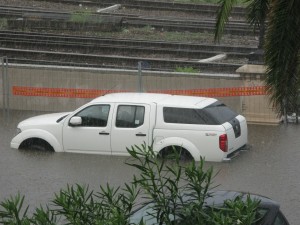Motor Vehicle Fleet Insurance: Benefits and Responsibilities
November 9, 2022 - 5 minutes read
Car that drove into a flood! (Image from Pixabay)
A motor fleet insurance policy for your church can save you money on car insurance. Find out what’s covered and what your responsibilities are.
If your organisation owns or leases multiple vehicles, commercial fleet cover can simplify the process of insuring them by placing them all on one policy. This usually works out to be more cost-effective than insuring individual vehicles on separate policies.
What a fleet policy can cover
A typical policy may include the following (depending on the situation):
- Vehicle theft, loss, or damage.
- Replacement vehicles in a total loss situation.
- Reasonable costs – such as for emergency repairs, travel, accommodation, towing, and vehicle storage.
- Use of a hire vehicle where your vehicle has been stolen or damaged as a result of fire.
- Lease payout where there has been a total loss.
- Loss of personal effects.
- Legal liability.
- Cover for losses caused by an uninsured driver.
Premiums might be higher or lower depending on various factors – such as the radius of use, claims history, type of occupation, age of driver, class of licence, years of experience or location where vehicles are kept.
Of course, there are always events the motor policy will not respond to due to policy exclusions. Exclusions may include tyre punctures, driving a vehicle in a damaged condition, cases of vehicle neglect or where a vehicle can’t be driven due to breakdown, consumption of alcohol or drugs, incorrect class of licence, or a cancelled or suspended licence.
Your responsibilities
As for all types of insurance, the policyholder has a responsibility to act safely and reduce their level of risk. Failure to do so could result in a claim being denied or paying a high excess in an accepted claim. This includes taking the following actions.
Advising your insurer of:
- Any changes to your business’s activities.
- Any modifications to your vehicles.
- Change of address/location where vehicles are parked, used or garaged.
- Any additional vehicles to be added to the fleet.
- Driver licence suspensions.
Reducing your risk of accidents:
- Do not drink-drive and always comply with road rules – fairly obvious!
- Avoid driving into flooded areas.
- Park vehicles in a safe location.
- Regularly maintain your vehicles to avoid problems likely to lead to accidents (e.g. faulty brakes or worn tyres).
- Do not lend vehicles to unauthorised and unlicenced drivers. If you do and the driver is involved in an accident, you may be required to pay a hefty excess or your claim could be declined altogether.
- Keep vehicles secure by locking them when not in use. Especially avoid leaving keys in plain sight, or worse still – in the ignition!
- Avoid overloading any of your vehicles.
Reducing your speed on the road can also make a significant difference in reducing the risk of accidents.
According to research by the Road Accident Research Unit at Adelaide University, the risk of a casualty crash doubles with each 5km/h over 60km/h, and speeding in an urban area is as dangerous as driving over the limit for alcohol.
What about insuring electric vehicles?
The number of EVs on the roads is increasing. Eventually, combustion engine vehicles will go the way of records, cassette tapes, and cameras-with-film – that is, become more of a novelty!
When it comes to insuring EVs, standard protections will still apply but there will be new factors to consider. This may include shifting government regulations, battery warranties and liabilities, risks from recharging vehicles, and third-party battery rentals.
Fleet insurance for churches and charities
Contact our team to discuss motor vehicle fleet cover for your church or if you have queries about your CCI policy.
Written by Tess Oliver
Tags: Driving, risk management
Recent Comments